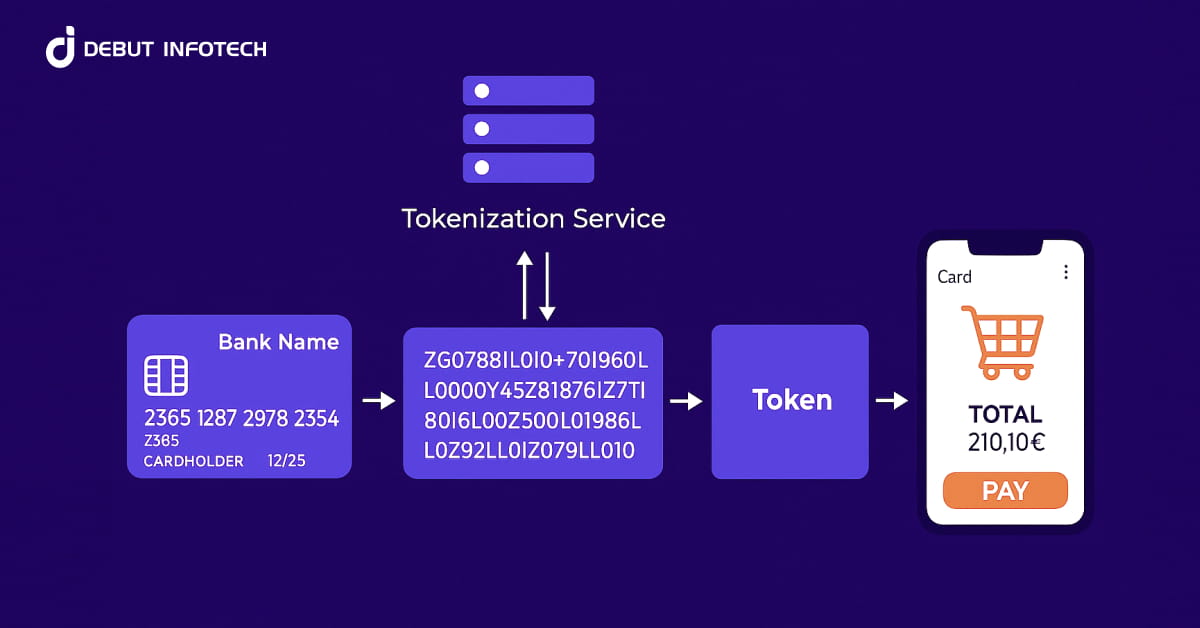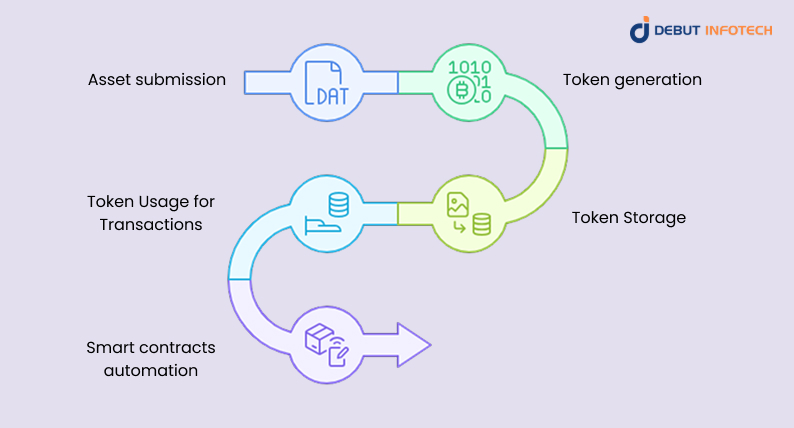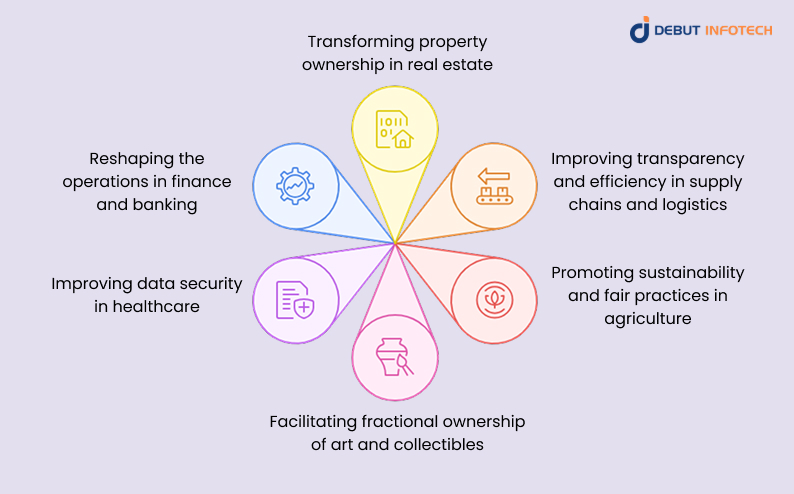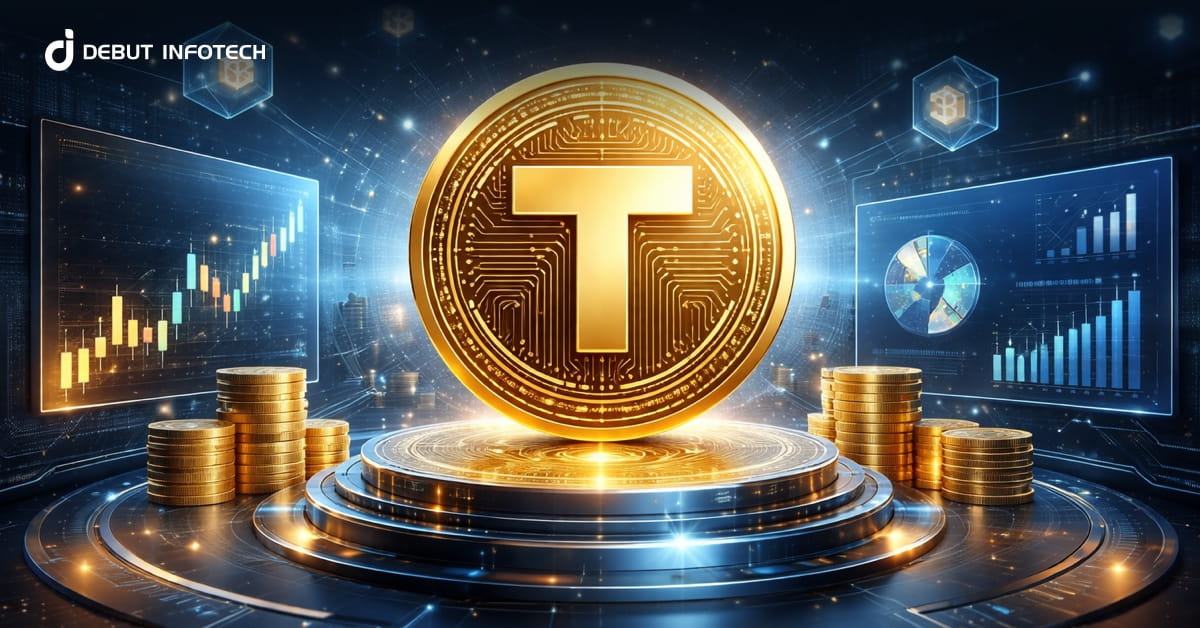Table of Contents
Home / Blog / Tokenization
What is Tokenization as a Service? Use Cases and Benefits for Modern Businesses
June 16, 2025

June 16, 2025
Tokenization as a service is a service delivery model that allows businesses to convert sensitive or real-world assets into digital tokens.
Let’s unpack a few things there to get a better understanding.
Tokenization, the keyword in tokenization as a service, means transferring ownership rights of an asset, whether digital or physical, into digital tokens on a blockchain network. For example, tangible assets like real estate, artworks, and even financial securities are digitally represented on the blockchain network as being made of units of digital tokens. Consequently, ownership of such tokens will signify ownership of units of such assets.
However, for any business, organization, or asset owner to do this (i.e., tokenize assets), they would need to understand the complexities of blockchain technology, i.e., they need the digital infrastructure for tokenizing these real-world assets.
That’s where Tokenization as a service comes into the picture. It represents a situation whereby another platform provides the blockchain infrastructure for other businesses or asset owners to create and manage digital tokens representing ownership of rights to an asset without dealing with the complexity of blockchain technology.
Have you ever heard of Software as a Service (SaaS)?
It’s a bit like that.
While SaaS requires users to pay a subscription fee to use a particular software product, a tokenization service requires users to pay a fee to create and manage digital tokens using that platform so that they don’t have to manage the underlying blockchain infrastructure themselves.
Tokenization as a service (TaaS) platforms provide end-to-end services that simplify the tokenization process. They allow companies to convert a wide range of assets into digital tokens that can be easily accessed or traded on the blockchain network.
In this article, we’ll explain how tokenization works, its possible use cases, and the potential benefits of tokenization as a service.
Deploy your asset tokenization platform on your chosen blockchain network with ease.
Schedule a consultation with our tokenization experts to start converting your real-world assets into tokens.
How does Tokenization as a Service (TaaS) Work?
Let’s say an asset owner or business wants to tokenize their real-world assets using a Tokenization as a Service (TaaS) platform.
What does the process of doing that look like?

The following steps represent a summary of how a tokenization service works.
1. Asset submission
This might sound obvious, but it starts with the asset owner or business submitting essential details about the asset to be tokenized to the TaaS platform. This information could be anything from real estate deeds to art ownership documents, and depending on the TaaS platform, the submission can be done via integrated software or an application interface.
Regardless of these details or their submission modes, the key is that they are presented to the tokenization service.
2. Token generation
As the name implies, the TaaS platform now uses its infrastructure to create a unique digital token meant to replace the original essential information presented for tokenization. The unique digital token is a string of characters generated randomly or cryptographically.
This transformation is done so that no sensitive information is revealed or can be traced back to the original information. In fact, the tokens don’t make sense and aren’t useful outside the context of this platform.
3. Token Storage
Now, we have two sets of information: the original information presented by the asset owner and the unique digital tokens the TaaS platform is representing them with.
After generating the unique digital token, the TaaS platform safely stores the original sensitive data in a secure vault. The platforms store this data securely to separate it fully from the unique digital tokens and ensure that the details don’t get into unauthorized hands.
4. Token Usage for Transactions
Having replaced the authentic sensitive information with unique digital tokens and stored the sensitive information safely, the TaaS platform now allows the asset owner or business to process transactions with the tokens. This means businesses don’t need to handle the sensitive information when buying, selling, transferring, or trading the physical assets. Instead, they do all that while dealing with the tokens alone.
Furthermore, the TaaS platform has now begun to record token ownership and transactions of physical assets that have been transformed into tokens on the blockchain network. This signifies a gradual shift towards managing the tokens on the blockchain for the business or asset owner.
5. Smart contracts automation
Finally, the tokenization service puts the entire operation on autopilot with the help of self-executing contracts known as smart contracts. Smart contracts can easily automate actions like ownership transfer and dividend payments.
From that moment onwards, users can use the tokens repeatedly for transactions without the manual intervention of either the TaaS platform or the business using the platform. This is how Tokenization as a Service helps businesses and organizations tokenize their real-world assets.
Some Common Business Use Cases of Tokenization as a Service (TaaS)
So, why would businesses like yours need a tokenization service to help them convert real-world assets into tokens?

The following are some notable use cases you should be familiar with.
1. Transforming property ownership in real estate
Real estate agencies and businesses can apply tokenization as a service to their operations to access a wider pool of customers. This is because real estate tokenization enables fractional ownership in the sense that investors can now buy small portions of properties by purchasing smaller units of real estate tokens instead of the whole property.
Previously, only institutional investors with deep pockets could access these investment classes. But now, when real estate agencies tokenize their real estate properties with the help of a TaaS platform, both institutional and retail investors have access, which means the business can tap into a larger investment pool.
2. Improving transparency and efficiency in supply chains and logistics
Businesses in the supply chain and logistics industry can also enhance the traceability and transparency of their operations with the help of tokenization as a service. The problem in this industry is that the supply chain businesses can’t always guarantee the integrity of products whenever they are in transit.
However, by tokenizing the automotive components of the supply chain, the business can now guarantee end-to-end traceability. This is because the tokens track the product origin and quality from the source all the way to the consumer. Consequently, supply chain management firms and logistics businesses can now guarantee the authenticity of the products and reduce counterfeit issues at every stage of the supply chain.
3. Promoting sustainability and fair practices in agriculture
Traders, farmers, and consumers in the agricultural sector can also participate in a secure, efficient, and equitable ecosystem with the help of tokenization as a service. A huge part of this possibility can be credited to the same effect experienced in the supply chain and logistics industry, which is the ability of tokenization to transform the way resources, goods, and services are managed across the supply chain.
TaaS platforms can help tokenize even agricultural assets like crops, livestock, and farmland. And by so doing, it eliminates the arbitrariness that makes it difficult to manage and monitor these assets. The agricultural use cases further extend to land tokenization, equipment leasing, and supply chain transparency.
4. Facilitating fractional ownership of art and collectibles
Do you ever think only ‘wealthy, luxurious individuals’ can access or appreciate the finest of artworks and the rarest collectibles?
Well, not anymore.
Like most real estate assets, artworks and collectibles can be very expensive, making them only accessible to high-net-worth individuals. As a result, the art and collectibles economy may be a tad slow, with sales occurring occasionally when a wealthy entity picks an interest.
However, if a business in this industry tokenizes these assets, allowing interested investors who may not have the resources to outrightly own the assets to own partial rights to them, things could move a lot faster. And that’s what a tokenization service helps businesses in this industry do.
Some more specific use cases include:
- Art crowdfunding
- Royalties distribution
- Collectible tokenization
- Digital art and non-fungible tokens (NFTs)
- Art tokenization
5. Improving data security in healthcare
Healthcare organizations can use tokenization as a service to convert sensitive healthcare data and assets into secure blockchain-based tokens. On a simple level, this use case helps to protect the healthcare information. Remember, we discussed how the TaaS platform stores the information away in a secure vault?
But, there’s so much more that can be done in healthcare with tokenization as a service.
For example, this airtight security facilitates seamless sharing and compliance with regulations like HIPAA. It also facilitates patient-centric healthcare services while reducing administrative inefficiencies.
Here’s a simple use case emphasizing this: If a healthcare organization stores a patient’s health information on the blockchain network, another authorized healthcare organization can easily access it on the same blockchain network if the patient needs urgent care.
6. Reshaping the operations in finance and banking
This is the most common use case of tokenization as a service. Nonetheless, tokenization as a service can do a lot to improve operations in the finance and banking sector.
For example, tokenizing invoices and trade documents streamlines financing, thus providing quicker access to working capital and reducing the cumbersome paperwork often associated with such processes.
Not only that.
When an organization uses a TaaS platform to convert traditional financial instruments into blockchain-based tokens, it can gain access to larger liquidity pools and business opportunities. Finally, it addresses the inefficiencies and bottlenecks often associated with traditional financial processes.
Those are some popular use cases for which businesses like yours are leveraging the capabilities of tokenization as a service.
So, what do they stand to gain from a business standpoint?
Find out in the following section.
Business Benefits of Tokenization as a Service
From improving efficiency to unlocking new business opportunities, the following are some of the vital business benefits of tokenization as a service:
1. Enhanced security and reduced risks of data breaches
When your business uses tokenization as a service in core aspects of its operations, you have a lower chance of data breaches because most of your essential information has been converted to ‘meaningless’ strings of characters, with the data itself securely locked away. So, even if the tokens are intercepted and stolen, they will still be useless to hackers, thus keeping your business protected.
2. Faster operational speed and improved operational efficiency
With all your vital details on the blockchain network, activities tend to proceed faster. Transactions are now automated, smart contracts also automate contract obligations, and everything just runs like a well-oiled machine. In response, your organization drastically cuts down manual errors and redundant processes, thus making it even more efficient.
3. Access to a larger investor pool and business opportunities
Tokenization of real-world assets enables fractional ownership by granting retail investors easier access to investment vehicles that were previously out of their reach. In turn, this means more business for any organization because they can now service both retail and institutional investors.
4. Improved customer experience and retention
Tokenization as a service can also help businesses retain more customers by enabling them to deliver better services. We can see this in most of the use cases highlighted earlier.
For example, in supply chain management, your business develops more integrity when customers are sure you can guarantee the authenticity of the products and reduce counterfeit issues they may be experiencing.
The same can be said of financial services and real estate agencies, where real-world assets are converted to digital tokens.
5. Transparency and traceability
Tokenization based on blockchain guarantees auditable, unchangeable records of every transaction. This transparency facilitates auditing and increases stakeholder trust, particularly in intricate multi-party networks.
6. Cost savings and reduced liability
Operational efficiency, elimination of counterfeit issues, faster operational speed, and transparency are all benefits that ultimately culminate in business cost savings and reduced liability. Tokenization as a service, when used accurately, can put your business light years ahead of the competitors if you execute it expertly.
Conclusion: Adopting Tokenization as a Service for Your Business
By now, you know what is tokenization as a service stands for and how it empowers a business to convert sensitive data and real-world assets into unique digital tokens. When a business does this, tokenization as a service helps such businesses beef up security, streamline regulatory compliance, and unlock new business opportunities.
Whether it’s in real estate, finance, healthcare, or supply chain management, a tokenization service can help your business enable fractional ownership and improve transparency.
For business leaders and senior executives trying to enjoy these benefits, there are a couple of things you must do. Start by identifying assets that could be tokenized and examining the technology and regulatory landscape. Next, don’t just rush into it. Instead, try launching a pilot project to test the waters and refine your strategy accordingly.
But you don’t have to do it all alone.
Try to partner with a trusted provider that understands both the technical and business side of token development to give you the leverage you need. That partner is Debut Infotech Pvt Ltd. With a proven track record of delivering secure, scalable solutions for businesses worldwide, Debut Infotech is the partner you can rely on to bring the transformative power of Tokenization as a Service to your organization.
Tokenize any real-world asset you want while we handle the complexity of blockchain.
Focus on accessing a global investor base while we handle the tokenization technicalities to give your business the edge it needs.
Frequently Asked Questions (FAQs)
A. These are digital tokens created on a blockchain and representing a software-as-a-service platform’s features, use credits, or access rights. They give users the freedom and transparency to safely access, exchange, or manage software features and ownership.
A. Imagine substituting a distinct token for a credit card number in online transactions. Sensitive information is never revealed during processing because this token is used in place of the actual card number, thus enhancing security and lowering the possibility of fraud. That’s a simple example of tokenization.
A. A token service retains the original data in a secure vault and substitutes safe digital tokens for sensitive data. While the actual data is kept safe, tokens are used for access or transactions. Specialized platforms that guarantee security and compliance oversee this procedure.
A. Blockchain is a distributed ledger technology that records and validates transactions, whereas tokenization is the process of turning rights or assets into digital tokens. Blockchain technology can be used for tokenization to provide security and transparency, although not all tokenization needs blockchain.
A. The use case and criteria determine which blockchain is ideal for tokenization. Though other choices like Polygon, Binance Smart Chain, or permissioned blockchains may be selected for scalability, cost, or regulatory requirements, Ethereum is often employed for its strong smart contract capabilities.
Our Latest Insights



Leave a Comment